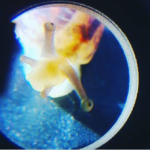The U. Abides › Forums › Departmental Forums › Agricultural Theology › Consider the Snail
- This topic has 2 replies, 2 voices, and was last updated 5 years, 3 months ago by
 The_Snail_Abides.
The_Snail_Abides.
-
AuthorPosts
-
-
November 12, 2019 at 3:26 pm #39857
 The_Snail_AbidesParticipant
The_Snail_AbidesParticipantFor a little over a year now I have been raising and studying snails as a means to my own amusement. I find them extremely fascinating. Everyone knows that snails are slow and like to eat your garden, but what else do snails do?
A snail does nothing it doesn’t want or need to do. If a snail dislikes the weather on a particular day, it simple reclines into its shell, covers its entrance with a layer of protective dried mucus, and sleeps. Inside the comfort of its shell it can remain dormant for up to three years.
When the temperatures and moisture levels are comfortable, and the snail feels like it, the snail emerges. The first thing it will do is use its raspy tongue to clean the entrance and front of its shell and cover it with a new comforting layer of mucus.
Next, it will slowly extend its stalky tentacles to smell the surrounding area. Although they do possess eyes, they have grown weak do to lack of use over many generations and function only to alert the snail of the sudden movements that indicate a threat. I assume this is because a snail cares not what anything looks like, but only what it smells, and [hopefully] tastes like. A snail can smell a head of lettuce from as far as seven feet away and is the only creature to have adapted the ability to smell calcium, which it needs to keep its shell strong.
Snails often prefer to be active(or barely so) during late night and early morning. When a snail smells another snail whose pheromones are compatible, it will crawl over the other snails shell to show its interest. If both snails are interested, they will proceed to circle and crawl over each other for anywhere between a few minutes and 12 hours or more, in a courtship ritual. This is to ensure that both snails are indeed interested in mating with each other. If one snail is uninterested, they will go their separate ways. Trying to convince the other snail, or to go against its will, would be a waste of time, there are plenty of snails in the garden.
-
December 21, 2019 at 2:49 am #42741
 LemonhopeParticipant
LemonhopeParticipantWow, I’d certainly attend your lectures on snails.
-
November 11, 2020 at 4:48 pm #66528
 The_Snail_AbidesParticipant
The_Snail_AbidesParticipantIt’s been a year since my original post, and I’ve learned a lot since. I’ve also unlearn a lot due to studying less and too much stress. I’ve had to downsize the amount of snails I have due to lack of space. I don’t keep common garden snails anymore, but recently impulsively adopted 3 Monadenia snails.
Something I’ve noticed is that slower moving snails seem to live longer, on average. So do snails that hibernate more. I wonder if this can be applied to humans.
I’m going to try to post weekly as I learn and relearn.
-
-
AuthorPosts
- You must be logged in to reply to this topic.
